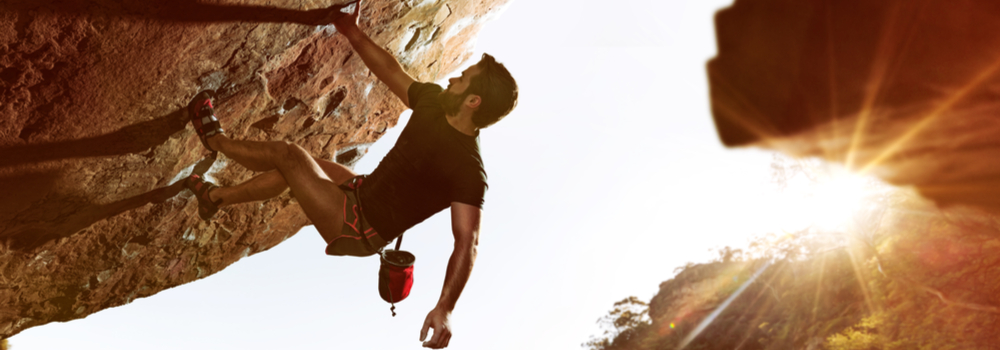Rock climbing is one of the most intensive, challenging natural outdoor sports there is. Climbing in a gym provides all of the same benefits for mind and body. Mistakenly, many believe that rock climbing is for people with tremendous upper body strength. While it is true that rock climbing does require upper body strength, it also requires the focus and engagement of just about every single muscle in your body. Developed climbers have a tremendous amount of strength in their core, their legs, their upper body, their feet, and their hands. Even novice climbers notice how quickly they build muscle mass, definition, and muscle memory.
Spirituality plays a part in climbing as well. Many spiritual lessons can be gained from the way you approach a route to the way you climb it. For example, you have to accept what has been given you, whether on a natural route or a manmade route. Within the route, there is an answer, there is always a solution, you just have to get through the crux to find it. Climbing asks you to have patience, to focus on your breath, to take it slow, to go with the flow, to trust, and to have humility. From all of these lessons we gain a better sense of self, more confidence, and, according to research, we can lessen our experience with depression and anxiety.
Depression and anxiety are a natural part of recovery. Most people who get sober experience both depression and anxiety within their first year. Drugs and alcohol are mind-altering chemicals, which includes alteration of the way hormones and neurotransmitters are produced. Engaging the body in regular exercise activities that are stimulating for the body and the mind can reduce those passing symptoms. Post acute withdrawal syndrome, the recurrence of symptoms of withdrawal, can happen on and off again for up to the first 18 months of sobriety.
The University of Arizona found that bouldering, rock climbing on shorter routes without a harness and rope, greatly reduces depression and anxiety. More than 100 adults participated, one group of whom immediately started bouldering and the other who had to wait. Each group bouldered for three hours a week for eight weeks. The researchers used the Beck’s Depression Inventory and Symptom Check List Revised to evaluate the effect bouldering was having. A significant improvement of over six points came to those who could start bouldering immediately. Though each group spent three hours a week for eight weeks bouldering, the group whose start was delayed saw just over a one point improvement.
Tree House Recovery, a men’s residential treatment program for addiction in Portland, Oregon, focuses on immersing residents into their natural environments and abilities. Building the body and the mind, we teach men how to find freedom from addiction through sustainable change. Call us today for information: (503) 850-2474




